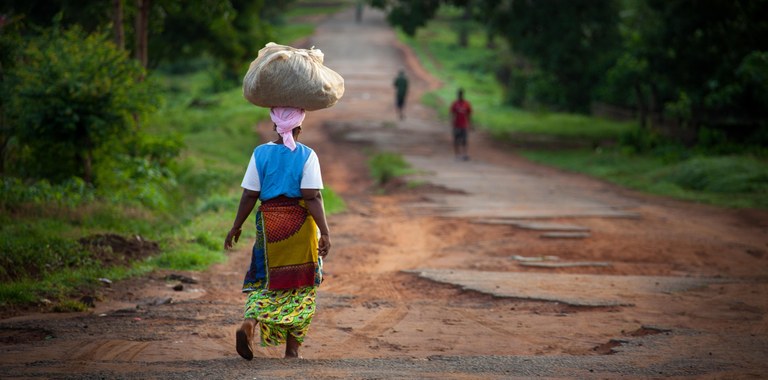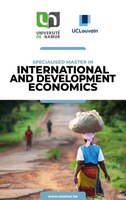
S P E C I A L I Z E D M A S T E R I N
I N T E R N A T I O N A L A N D D E V E L O P M E N T E C O N O M I C S
The ARES call to apply for a scholarship for this master is now closed.
The next call will be launched in November 2023.
The Specialized Master in International and Development Economics (SMIDE) aims to train present and future actors of development to be able to devise realistic and innovative programmes which are based on sound economic analysis and well adjusted to the social and political context of a country.
This 60 ECTS one-year postgraduate programme has been offered jointly by the Université de Namur and the Université Catholique de Louvain for more than 20 years.
Enrol for this programme
Y O U R O B J E C T I V E S
- To acquire international standards of economic analysis and increase your abilities in this field
- To complement your personal experience with foreign perceptions of the world economy
- To gain the maturity needed to further sharpen your professional or research objectives
- To be able to design and implement innovative programmes for economic and human development
- To understand and assess the models and methods used by international organisations, foreign governments and consultants in development assistance and international economic relations
- To play an educational role by explaining to local decision-makers the rationale and usefulness of economic reforms in their local context.
W H Y S T U D Y A T U N A M U R ?
|
|
The programme’s professorship includes academics with a well-established international reputation and extensive field experience in developing countries (India, Poland, Andean countries, Sub-Saharan Africa, etc.). |
|
|
You will have access to pedagogical resources (libraries, language and computer labs, etc.) on both the UNamur and UCLouvain campuses. |
|
|
The University campus is situated in the centre of Namur, a small and student-friendly city only 60km from Brussels, the capital of Europe. |
|
|
The program is fully taught in English. |
P R O G R A M M E
The courses and seminars take place mainly at the University of Namur. Once a week, lectures are held at the Université Catholique de Louvain in Louvain-La-Neuve.
The programme starts with a one month course reviewing the main analytical tools of economics. Whilst mostly theoretical, classes make constant reference to the applications of these concepts and methods. An evaluation takes place at the end of the first month. Those who show deficiencies are required to retake these exams before the end of the first semester.
The programme has a two-sided economic approach. On the one hand, it analyses macroeconomic and trade policy issues related to the growth of an economy within the world market system.
On the other hand, it analyses ways of reducing poverty and inequality and explores the institutional structures required for the effective working of a market economy in the context of specific countries.
Macroeconomics and Trade Policies
The macroeconomics theme addresses the issues of macroeconomic fluctuations, macro-finance and development. It focuses on the determinants of the balance of payments, domestic growth rates, employment level and structure, inflation rates, public sector accounts and external debt.
Particular attention is devoted to the interaction between exchange rates, interest rates, monetary and fiscal policy instruments and the real world economy.
Case studies on different countries are used to assess the relative costs of adjustments or policies, as well as to evaluate the contribution of various policy regimes or macroeconomic policies to sustainable and balanced growth objectives.
The programme also studies the opportunities and constraints met by an economy when it integrates into the world market economy. Special attention is devoted to themes such as the relationship between economic growth and international trade, the role of multinational firms, the localisation of activities and the management of adjustment costs after trade shocks.
Trade and policy aspects are also analysed: the strategic behaviour of firms and governments and the role of regional and supra-regional organisations.
Development and Institutions
The subjects offered in this field cover the key topics in development economics today. The topics include:
- Poverty: We discuss key concepts and measures of poverty and inequality. We examine the current situation of poverty in the world and conduct a criticalanalysis of the Sustainable Development Goals.
- Microfinance: We study the role of formal and informal lending institutions in developing countries and discuss whether microfinance can be considered a «revolution» in development.
- Education: We examine the decision to invest in education at a micro and a macro level and discuss what we know today about the return to education.
- Gender issues: We present Amartya Sen’s analysis of ‘missing women’. We discuss discrimination at the level of households and study the main decision models including intra-household bargaining.
- The links between poverty and the environment: After an introduction to environmental economics and its key concepts, we examine what we know today about the relationships between development, poverty and the environment.
- The role of institutions in development: Different economic approaches to institutions are presented, discussed and illustrated. Modes of transaction, contracts, informal arrangements and social norms receive particular attention. The underlying functions of saving on transaction costs, overcoming incentive problems and providing coordination are highlighted. Two important fields of the application of institutional analysis are covered in more detail: systems of property rights and agrarian contracts.
Each topic is covered in formal lectures and an emphasis is placed on policy responses to central problems in development today.
Each course also provides with essential methods and tools that can be applied to a wide range of economic problems. In particular, you will learn how to compute and assess poverty measures, how to conduct a cost-benefit analysis and a rigorous impact evaluation and how to address the issue of institutional choice in specific situations. Various personal projects provide opportunities to apply these tools.
The programme ends with the completion of a personal study project on an economic topic. This research project is continuously developed throughout the year and is subject to critical appraisal from fellow students and professors. The project consists of a case study – a theoretical or an empirical analysis. Public presentations of the project at various stages aim to contribute to the group learning experience. The final report will consider a precise economic issue.













